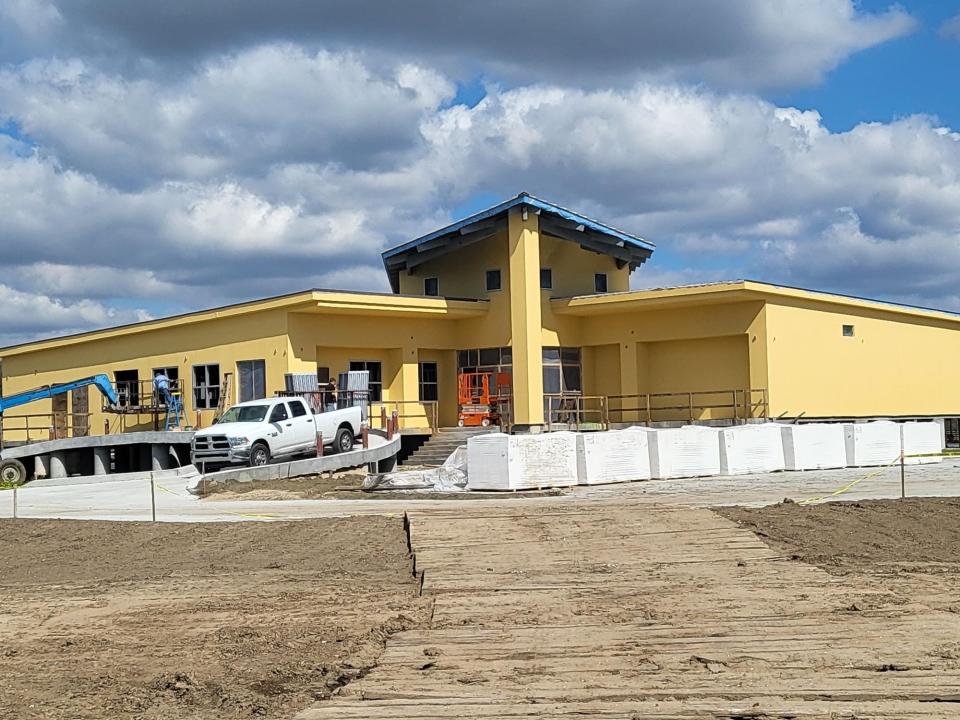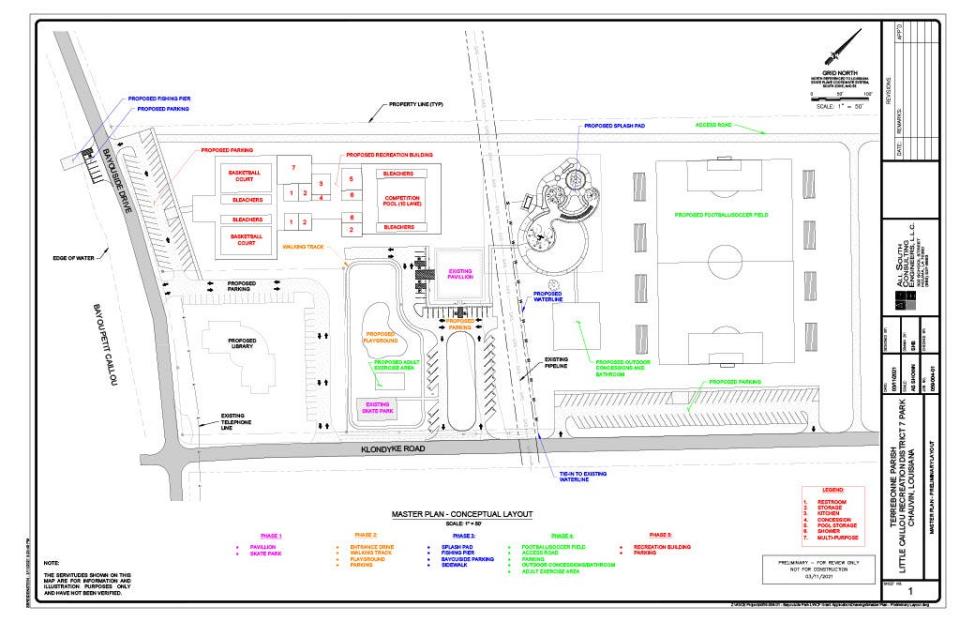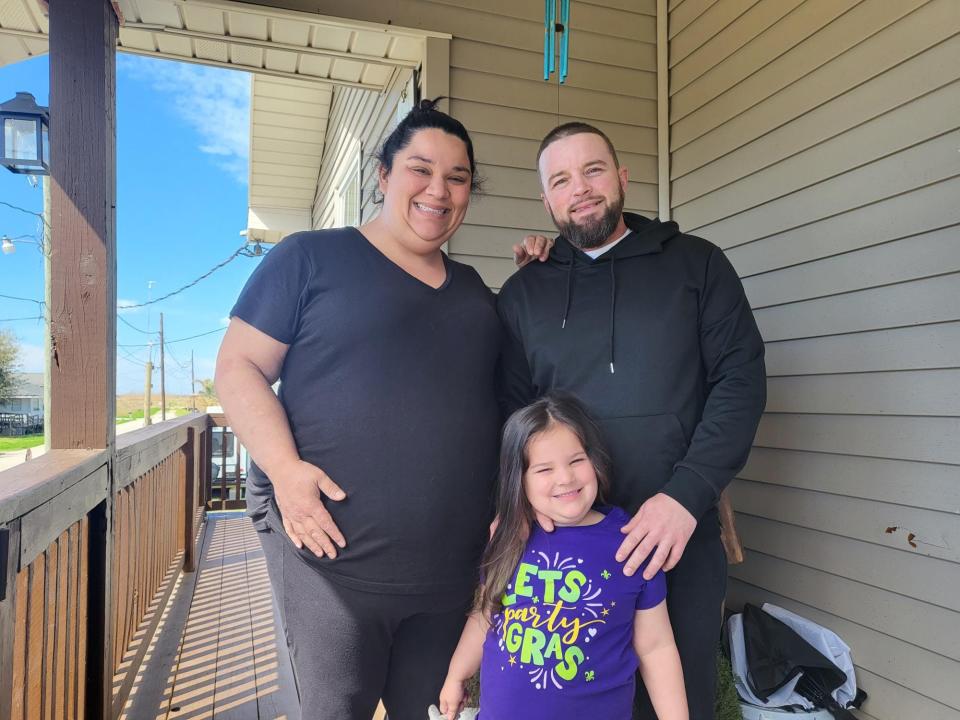Residents say the Chauvin, Montegut, and Bourg communities are being uprooted
Shorelines erode easier when there are no roots to hold them together. Similarly, as centers of the bayou communities are moved northward, the people drift away.
Seamstresses Phylis Henry, 67, and Sandra Moss, 77, sit in the Chauvin library snipping threads from the bags they created. As others enter the library searching for tax forms or help with the internet, Moss and Henry greet each by name. They are the founders of the sewing group Crafty Ladies, which creates quilts and bags for local nursing homes and other nonprofits. They gather with the six other members of the group once a week at the Chauvin library to work on their projects.
"We had some friends who wanted to quilt, so we said let's come here because our friends live here," Henry said.

Moving and Upgrading
The library is destined to close along with the Bourg and Montegut branches, about September, when the new branch is completed at the corner of Bayouside Drive and Klondyke Road, 4377 Bayouside Dr. The $4 million, 8,000-square-foot facility will feature a meeting room that seats 140, three study rooms and a drive through. It will have extended hours from 9 a.m. to 8 p.m. Monday through Thursday, and 9 a.m. until 5 p.m. on Saturdays.
The Bourg and Montegut branches already are closed. The Bourg branch was totaled by Hurricane Ida. The Montegut branch's sewage system failed, and it would cost more than $65,000 to repair because of asbestos in the floor, according to Terrebonne Parish Library Director Mary Cosper Leboeuf.
Leboeuf said the plan to merge the three branches was in the works before Hurricane Ida struck, because the library system wanted to make space for new technologies and was adjusting to the already declining populations of the area.
The plan is to work with the Recreation District to add sports facilities on the property for the residents of Chauvin to have both the library's facilities and sporting equipment.

Another Blow
Henry lives one block from the current Chauvin library and doesn't want to see it close. Moss lives close to where the new branch will be located and is excited for the new facility, but she said she also laments the community's loss. She said it was just another thing to leave the community.
"It's sad, it's so sad, when we drive the roads and see the abandoned homes," she said. "It's like closing Lacache, oh my God y'all, that is hard to accept."
Lacache and Montegut middle school will be merged and built on a new property near South Terrebonne High School.
The two say it's a gradual process that has been happening to Chauvin and the southern Terrebonne community at large. Both have lived in the area their entire lives, and told of how their fathers grew up even further south, in Cocodrie as hunters and trappers. A hurricane in the 1920s devastated the area and pushed those ancestors north to Chauvin. Moss said at one time there were five schools along their bayou and Boudreaux Canal Elementary was the first domino to fall. The school board voted to close it in May of 2013.
Places like Lacache Middle School, the Little Caillou Swimming Pool, Little Caillou Gym and more are what give Chauvin, Montegut and Bourg their identity. The two said as resources move north so will the people. Their communities won't have anything left, and when that happens, the community will cease to exist.
"The more you move things away, it's like there's not a lot to do down the bayou," Henry said. "If you don't help communities to stay in their communities, you die."
The Roots that Bind
The Water Institute's Senior Research Scientist Scott Hemmerling has studied coastal population migration trends from the 1950s through to present caused by economic and environmental factors, and has co-written two scientific papers on the subject.
More: Investment and Adaptation in Vulnerable Communities
He agreed with Moss and Henry, and said people within a community almost never move away for one factor; rather, communities are formed around a number of pillars that create the identity and root people to the area. As each pillar is removed, people are increasingly likely to drift away.
"You can have your storm effects, you can have all of these impacts that affect these communities, and they will rebuild," he said. "But when you start losing these key essential facilities, and libraries, schools, and the Rec. Districts, these are essential. They might not be critical facilities, like hospitals and police stations and fire stations, but these are really the things that give you a sense of community and a sense of place. So consolidating those all in to one could have some negative impacts on the ability of these communities to remain in that place."
As people leave, he said, the tax base diminishes. It can negatively affect the remaining facilities, and the problem can compound. There also are intangible anchors that bind people to a place as well, he explained, the sentimental and the financial. The sentimental is a sense of belonging to a community and it can be factors like family living in the area. The financial is the affordability and job opportunities of an area.
Moss and Henry said the only thing keeping them in the area now is their houses, but rising flood insurance costs are putting that in jeopardy, too. The insurance already drove away their children because the insurance to own a home is too much for new families starting out. Insurance prices drastically change south of the Intracoastal Canal, they said.
"If they are going to invest in a home, they are going to invest on the other side of the tunnel," Moss said.
Henry said her homeowners insurance is $8,000 and her flood insurance is $3,000 a year. As it keeps rising, she is considering dropping it altogether. She said she cannot even sell the home to move into anything nearly the same value because her 1,800 square foot home, with four beds and two baths, would likely not even get $133,000.
"Now, what could I get for $133,000 in Houma?," Henry said. She and Moss began to laugh. "A trailer! A trailer in the backyard of one of my kids."
Moss agreed that her home was the final straw for her also. She said the home is paid off and she's on a fixed income.
"Take somebody at my age, 77, it's paid for, limited income, what's my choices?" Moss said. "Sell this at, what, not even half of what I've invested, and then I'm going to rent somewhere?"
Giving up on their Home

Behind Pizza Express, and down Oleander Street, Brett Theriot played on his porch with his 4-year-old daughter, Teagan. Theriot is a shrimp boat captain who has currently hung up his hat and taken up his side-gig as a carpenter, Theriot's Cabinets, full time to pay his bills. Shrimping just isn't profitable right now. The shrimp are plentiful, but the prices are not.
They live in his wife Amber Galliano's home. She is 37, and has lived in the home since she was 3 years old. The couple have another child on the way, and they have no intention to remain in Chauvin. Theriot is using his carpentry skills when he is not working to finish repairing the home from damages caused by Hurricane Ida. As soon as it is complete, they are looking to sell.
Teagan loves to read, and they said they take her to the library at least once a month. It's sad to see it go, Theroit said, but his qualms about raising children in Chauvin go beyond the library. Children need something to do, and Chauvin just doesn't provide anything right now, Galliano said.
"Honestly, we want to move out of Chauvin soon, because I'm pregnant and I have a 4 year old and there's nothing for kids down here no more," she said. "Everything that we grew up having as children is closed, even the schools. No schools, no sports, there's nothing for kids down here."
This article originally appeared on The Courier: Chauvin, Montegut, and Bourg communities are being uprooted, residents say

